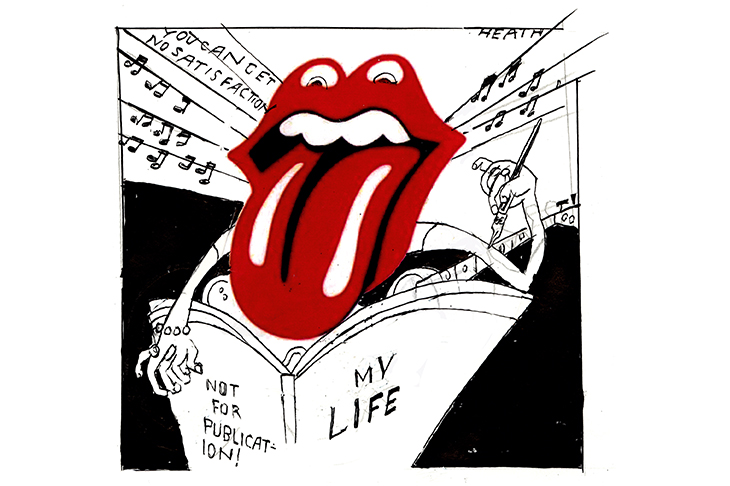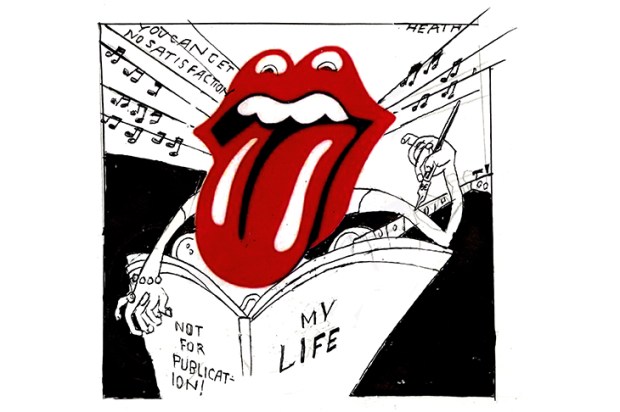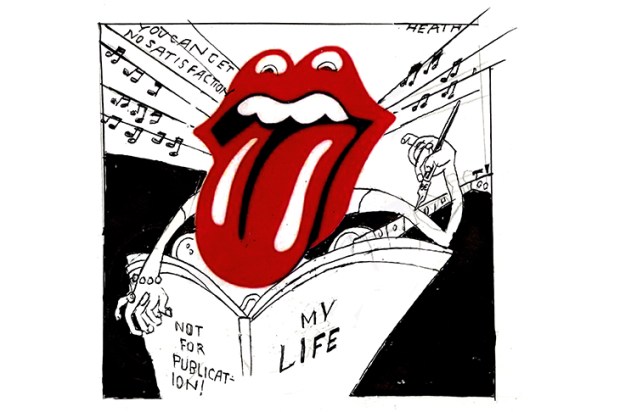Ask any publisher of popular non–fiction anywhere in the world which book they would most like to sign, and it is an odds-on bet that they would eventually, mostly, come up with the same title. Obviously the Queen does not plan to reveal all any time soon. Tom Cruise would certainly be interesting if he desired to talk about the crazy, outer-space cult which rules his women and his life. But for sheer history, global presence, intelligence and insight, there really is only one chap — the guy Ben Schott recently described in this magazine as ‘the most seen person on the planet’. Yes, the old prince of darkness himself, Sir Michael Philip Jagger.
Of course he’d never do it. He has said again and again, in countless interviews, that he never will. Except what virtually nobody knows is that he already has. Stuck in a secret hiding place right now I have Mick’s 75,000-word manuscript. It is an extraordinary insight into one of the three most influential rock stars of all time. (The other two, of course, are Elvis Presley and John Lennon.)
Leaving aside the historical importance of the story, the financial potential is almost J.K. Rowlingesque. Mick could start by signing and numbering 1,000 copies of the manuscript. I think, worldwide, there are enough rich fans to sell these at $1,000 a pop, especially if Mick were to put aside an hour to meet and greet the purchasers in a small theatre. That’s a million dollars, and we haven’t even got around to typesetting the thing yet.
Then would come the real party. The book could be published simultaneously in hardback in 50 languages — at £20 a pop. Keith Richards’s autobiography, Life, went to the top of bestseller lists in almost every country in the world. Keith is, of course, the human riff, on every level the real deal. But Mick is the embodiment of something bigger.
Mick helped to change Britain from a grey, authoritarian, post-war misery-fest into a glittering, sunny place. He argued on television with the Archbishop of Canterbury about the new morality. He was so feared by the establishment that they carted him off to prison for possession of four pep pills he had legally purchased in Italy, thus inspiring the Times’s ‘Who breaks a butterfly on a wheel?’ editorial. That is why politicians from Blair to Obama go starry-eyed in his presence. Even that famed rocker Donald Trump hijacked ‘Start Me Up’ as a theme song for his campaign.
So, how do I have this manuscript? Why does nobody know about it? And why will Mick not let anyone read it? It is a long story.
By the late 1970s Mick, who stays sane by staying private, was weary of people writing books about him and the Stones. I co-wrote one myself called Up and Down With The Rolling Stones. I am told that Mick did not dislike it. Keith hated it. The only time that Keith deigned to discuss it with me, he simply asked: ‘Would you like a .38 or a .45?’
It was this kind of thing that inspired Mick’s song ‘It’s Only Rock ’n’ Roll’, with those self–pitying lines about fans wanting him to stick his pen in his heart and to commit suicide right on stage. At this point the great Lord Weidenfeld persuaded Mick that the time had come to write his own book. This, he said, would close the floodgates for ever on all the unauthorised ones.
Mick was reputedly paid an advance of £1 million, an extraordinary figure for the time. A ghost was appointed and publication scheduled. Only it didn’t work out quite like that.
The popular, often-repeated version of events is that Mick approached Bill Wyman, the Rolling Stones’ self-appointed archivist, to help him with research. Wyman, legend has it, told Mick to go forth and multiply. He was going to write his own book.
Then, so the story goes, Mick floundered. All the years of drugs and debauchery had addled his brain so badly that he could not remember anything. Reluctantly he decided to give Lord Weidenfeld his million back and to walk away from the project. As a national newspaper rock journalist I knew Mick pretty well during this period. I travelled with him all over the world, was there when Jerry Hall was tried and acquitted of drug smuggling in Barbados, and even sat next to him at a bizarre lunch that he asked me to arrange with Robert Maxwell. Mick was always drawn to the very rich and very powerful. Perhaps that is where Jerry gets it from.
Anyway, I thought that was the end of the story until three years ago, when a mutual friend handed me a pristine typescript Mick had written. I was dumbfounded. This was the rock ’n’ roll equivalent of the Dead Sea Scrolls. So far as I have been able to ascertain, a publisher rejected the manuscript because it was light on sex and drugs. In the early 1980s, when it was written, shock and awe was a vital part of any successful autobiography.
Read now, however, it is a little masterpiece. A perfectly preserved time capsule written when the Stones had produced all their greatest music but still burned with the passion and fire of youth and idealism.
One of my favourite anecdotes is of Mick returning unannounced to Dartford to see his parents after two years of chaotic world tours, debauchery, mayhem, riots and goodness only knows what else. ‘Oh Michael,’ says his horrified mother on opening the door. ‘Your hair….’
The book shows a quieter, more watchful Mick than the fast-living caricature. He describes the little room he’d retreat to backstage before a performance, where he’d hide away, sizing up the audience. All that famous partying had to wait till afterwards. Those extravagant feasts that rumour had it the Stones demanded backstage: caviar, vintage champagne, stuffed quails… they never ate any of it. They took their shows far too seriously for that. He had carbs for an early lunch. Then water, ‘maybe eight pints’, because he’d lose ten pints on stage.
Mick tells of buying a historic mansion, Stargroves, while high on acid and of trying out the life of horse-riding country squire. Having never ridden a horse before, he leapt on to a stallion, whereupon it reared and roared off ‘like a Ferrari’. Summoning his wits and some half-remembered horse facts, he gave the stallion a thump on the forehead right between the eyes and slowed it down — otherwise the Stones’ story might have ended differently.
Then there’s the tedium of looking at Keith’s scraggy, monkey-like bottom night after night, but also the touching respect he has for Keith: always late, always smashed but ‘a creative genius’. The world needs more creative people like Keith, writes Mick.
It is delicious, heady stuff. Like reading Elvis Presley’s diaries from the days before he grew fat and washed-up in Vegas.
I was determined that this book needed to be published. Mick’s delightful manager, Joyce Smyth, responded encouragingly to my letter. Mick could not remember any manuscript. Please could I show it to him? Once he saw it, he asked if he could write a foreword to establish that he wrote this story long ago and far away. It seemed we were there. But then, as is the way with the Rolling Stones, life took over. There was a tragic death, a tour, a film, a TV series, the Saatchi exhibition. I kept gently pushing but when, eventually, I tried to force a decision, the steel gates clanged shut. Mick wanted nothing further to do with this project. He never wanted to see it published.
As a fan, as a publisher, I think I have now reached the end of Route 66. So, apologies to the 10 million people around the world who would love to read this story. After all, as the philosopher Jagger once said: ‘You can’t always get what you want.’
Got something to add? Join the discussion and comment below.
Get 10 issues for just $10
Subscribe to The Spectator Australia today for the next 10 magazine issues, plus full online access, for just $10.














Comments
Don't miss out
Join the conversation with other Spectator Australia readers. Subscribe to leave a comment.
SUBSCRIBEAlready a subscriber? Log in